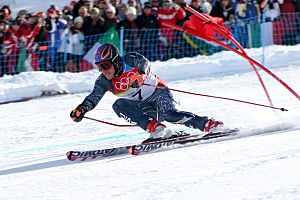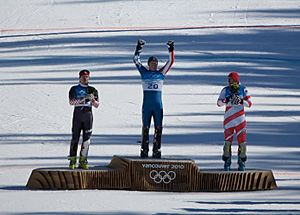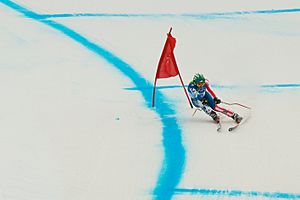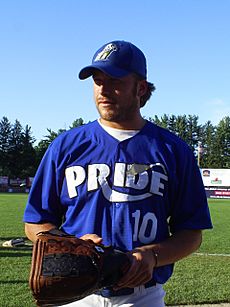Bode Miller facts for kids
| Alpine skier | |||||||||||||||||||||||||||||||||||||||||||||||||||||||||||||||||||||||||||||||||||||||||||||
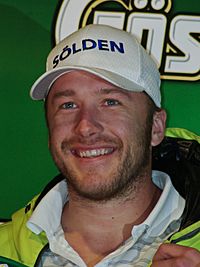
Miller in February 2011
|
|||||||||||||||||||||||||||||||||||||||||||||||||||||||||||||||||||||||||||||||||||||||||||||
| Disciplines | Downhill, super-G, giant slalom, slalom, combined | ||||||||||||||||||||||||||||||||||||||||||||||||||||||||||||||||||||||||||||||||||||||||||||
|---|---|---|---|---|---|---|---|---|---|---|---|---|---|---|---|---|---|---|---|---|---|---|---|---|---|---|---|---|---|---|---|---|---|---|---|---|---|---|---|---|---|---|---|---|---|---|---|---|---|---|---|---|---|---|---|---|---|---|---|---|---|---|---|---|---|---|---|---|---|---|---|---|---|---|---|---|---|---|---|---|---|---|---|---|---|---|---|---|---|---|---|---|---|
| Club | Franconia Ski Club / Carrabassett Valley Academy |
||||||||||||||||||||||||||||||||||||||||||||||||||||||||||||||||||||||||||||||||||||||||||||
| Born | October 12, 1977 Easton, New Hampshire, U.S. |
||||||||||||||||||||||||||||||||||||||||||||||||||||||||||||||||||||||||||||||||||||||||||||
| Height | 6 ft 2 in (188 cm) | ||||||||||||||||||||||||||||||||||||||||||||||||||||||||||||||||||||||||||||||||||||||||||||
| World Cup debut | November 20, 1997 (age 20) |
||||||||||||||||||||||||||||||||||||||||||||||||||||||||||||||||||||||||||||||||||||||||||||
| Retired | 2017 | ||||||||||||||||||||||||||||||||||||||||||||||||||||||||||||||||||||||||||||||||||||||||||||
| Olympics | |||||||||||||||||||||||||||||||||||||||||||||||||||||||||||||||||||||||||||||||||||||||||||||
| Teams | 5 – (1998–2014) | ||||||||||||||||||||||||||||||||||||||||||||||||||||||||||||||||||||||||||||||||||||||||||||
| Medals | 6 (1 gold) | ||||||||||||||||||||||||||||||||||||||||||||||||||||||||||||||||||||||||||||||||||||||||||||
| World Championships | |||||||||||||||||||||||||||||||||||||||||||||||||||||||||||||||||||||||||||||||||||||||||||||
| Teams | 8 – (1999–2015) | ||||||||||||||||||||||||||||||||||||||||||||||||||||||||||||||||||||||||||||||||||||||||||||
| Medals | 5 (4 gold) | ||||||||||||||||||||||||||||||||||||||||||||||||||||||||||||||||||||||||||||||||||||||||||||
| World Cup | |||||||||||||||||||||||||||||||||||||||||||||||||||||||||||||||||||||||||||||||||||||||||||||
| Seasons | 16 – (1998–2012, 2014) | ||||||||||||||||||||||||||||||||||||||||||||||||||||||||||||||||||||||||||||||||||||||||||||
| Wins | 33 | ||||||||||||||||||||||||||||||||||||||||||||||||||||||||||||||||||||||||||||||||||||||||||||
| Podiums | 79 | ||||||||||||||||||||||||||||||||||||||||||||||||||||||||||||||||||||||||||||||||||||||||||||
| Overall titles | 2 – (2005, 2008) | ||||||||||||||||||||||||||||||||||||||||||||||||||||||||||||||||||||||||||||||||||||||||||||
| Discipline titles | 6 – (2 SG, 1 GS, 3 K) | ||||||||||||||||||||||||||||||||||||||||||||||||||||||||||||||||||||||||||||||||||||||||||||
|
Medal record
|
|||||||||||||||||||||||||||||||||||||||||||||||||||||||||||||||||||||||||||||||||||||||||||||
Samuel Bode Miller (born October 12, 1977) is a famous American former alpine ski racer. He is one of the most successful male American alpine skiers ever. Bode won gold medals at the Olympics and World Championships. He also won the overall World Cup title twice, in 2005 and 2008.
Bode Miller is known as one of the greatest World Cup racers of all time. He achieved 33 race victories during his career. He is one of only five men to win World Cup events in all five alpine skiing disciplines. He is also the only skier with five or more victories in each discipline. In 2008, Miller and Lindsey Vonn both won overall World Cup titles. This was the first time American skiers had done this in 25 years.
Miller earned six medals at the Winter Olympics. This is more than any other U.S. skier. He won two silver medals in Salt Lake City 2002. At the Vancouver 2010 Olympics, he won a gold, a silver, and a bronze medal. He added another bronze medal at the Sochi 2014 Olympics. Miller is one of only five skiers to win Olympic medals in four different skiing events.
He finished his career with six World Cup discipline titles. He also won four World Championships titles in four different events. These wins were in giant slalom, combined, super-G, and downhill. He also won one silver medal at the World Championships. Bode Miller officially retired from ski racing in October 2017.
Contents
- Bode Miller's Early Life
- Bode Miller's Ski Racing Career
- Starting His World Cup Journey (1998–2001)
- Winning Double Silver Medals (2002)
- Becoming a World Cup Champion (2003–2005)
- A Challenging Olympic Year (2006)
- Independent and Champion Again (2007–2009)
- Olympic Success in Vancouver (2010)
- Last Victory and a Break (2011–2013)
- Comeback for Bronze (2014)
- Injuries and Retirement (2015–2017)
- World Cup Results
- Olympic Results
- World Championships Results
- Publicity and Media Attention
- Other Sports and Interests
- Personal Life
- See also
Bode Miller's Early Life
Bode Miller was born in Easton, New Hampshire. He grew up in Franconia, a small town in the White Mountains. His family lived in a log cabin without electricity or indoor plumbing. They lived on a large piece of land in a forest.
Bode was homeschooled until third grade. After his parents divorced, he started public school. He received a scholarship to the Carrabassett Valley Academy. This is a special ski racing school in Maine. He also played tennis and soccer when he was younger.
Miller first became widely known after the 2002 Salt Lake City Winter Olympics. He won two silver medals there. Before that, he was already known to ski fans since he was 18. Miller is famous for his daring style of skiing. He often took big risks to try and win races. He once said his goal was to ski "as fast as the natural universe will allow."
Bode Miller's Ski Racing Career
Starting His World Cup Journey (1998–2001)
Bode Miller first competed in the World Cup during the 1998 season. He also represented the United States at the 1998 Nagano Olympics. He competed in giant slalom and slalom events. In 1999, he also raced in super-G. He finished 8th in slalom at the World Ski Championships.
He earned his first World Cup podium finish in December 2000. He placed third in a giant slalom race. In 2001, he competed in super-G at the World Ski Championships. However, he crashed during the combined event and injured his knee. This injury ended his season.
Winning Double Silver Medals (2002)
In the 2002 season, Miller started racing in downhill events regularly. This made him a five-event skier on the World Cup circuit. He won his first World Cup race on December 29, 2001, in giant slalom. The next day, he won a slalom race. He won two more slalom races in January 2002.
In February, he won two silver medals at the 2002 Winter Olympics. This showed he was the top racer on the U.S. Ski Team.
Miller won his first Olympic medal on February 13, 2002, in the combined event. He was 15th after the downhill part. But he had an amazing second run in the slalom. He finished second overall, very close behind Kjetil André Aamodt. Later, Miller won another silver medal in the giant slalom. He was only beaten by Stephan Eberharter.
Miller almost won medals in all events he entered. He was second after the first run of the slalom race. He had a big lead before his final run. Instead of skiing carefully, Miller decided to go for gold. This led to a fall, and he missed a gate. He finished far from the medal positions. After this season, he changed ski brands.
Becoming a World Cup Champion (2003–2005)
Miller aimed for the 2003 World Cup overall title. He finished second to Stephan Eberharter. At the 2003 World Championships, Miller won three medals. He took gold in giant slalom and combined, and silver in super-G. He also won two other giant slalom races that season.
In the 2004 season, Miller won World Cup titles in giant slalom and combined. He finished fourth in the overall standings. He won six World Cup races that year. After the season, Miller switched to Atomic skis.
Miller won his first overall World Cup title in 2005. He beat Austrian skiers Benjamin Raich and Hermann Maier. He made history by winning at least one race in all four main World Cup events. These were slalom, giant slalom, super-G, and downhill. He was the second man to do this, after Marc Girardelli. Miller achieved this faster than any other skier. At the 2005 World Championships, he won two gold medals. These were in super-G and downhill.
A Challenging Olympic Year (2006)
There was a lot of excitement around Miller before the 2006 Winter Olympics. However, he did not win any medals. He finished 5th in downhill and was disqualified in the combined event. He did not finish the super-G or slalom races. He tied for 6th in giant slalom.
Despite this, Miller won two races during the season. He finished third for the season's overall World Cup title. After the World Cup season, he won downhill and giant slalom titles at the U.S. National Championships. He then switched to Head skis.
Independent and Champion Again (2007–2009)
Miller had four first-place finishes early in the 2007 World Cup. He finished 4th overall for the season and won the super-G title. In May 2007, Miller announced he was leaving the U.S. Ski Team. He decided to race independently.
In 2008, Miller won his second overall World Cup championship. He got his first win of the season in December. In January, he won the Wengen downhill for the second year in a row. This made him the most successful American skier with 27 World Cup wins. He broke this record by winning the Hahnenkamm combined event. He then won two super combined events and took the combined title. He won his sixth race of the season in March. At the end of this great season, he was crowned overall champion.
The 2009 season was difficult for Miller. He did not win a race for the first time in eight years. He had only two second-place finishes in downhill. He suffered a torn ligament in his left ankle in December. He took a break from competition in February and March. He hinted that he might retire.
Olympic Success in Vancouver (2010)
Miller rejoined the U.S. Ski Team. He missed much of the early 2010 season due to an ankle sprain. However, he returned to win a World Cup super-combined event in January 2010. This was his first victory in almost two years.
He made the U.S. team for the 2010 Winter Olympics. He competed in all five events. In his first race, Miller won a bronze medal in the downhill. He was the first American to win an Olympic downhill medal since Tommy Moe in 1994. He then won a silver medal in the super-G. This gave him four Olympic medals, more than any other American alpine racer.
On February 21, 2010, he won his first Olympic gold medal. This was in the super combined event. He was in seventh place after the downhill part. But he finished third in the slalom part, giving him the fastest total time. Miller then did not finish the giant slalom or slalom races. He took the rest of the season off due to his ankle injury.
Last Victory and a Break (2011–2013)
After his Olympic success, Miller had a less successful season in 2011. However, he still finished in the top 3 three times. He was third in a city event, second in a downhill race, and third in a super-G. At the World Championships, he was leading a super-G race despite losing a pole. But he lost his balance near the end and finished 12th.
Miller earned his 33rd World Cup win in 2011 with a downhill victory. He also finished 2nd in a super-G, 3rd in a super-combined, and 2nd in another downhill race.
After knee surgery in spring 2012, Miller decided to take a break. He announced in January 2013 that he would skip the entire season. This was to make sure he was fully healthy for his fifth Olympics in 2014.
Comeback for Bronze (2014)
At the start of his comeback season, Miller surprisingly finished second in a giant slalom race. This was his first podium in that event since 2007. His hopes of winning his first downhill race at Kitzbühel did not happen. He made a mistake and finished third. The next day, he finished second in a super-G race there.
Miller started the Winter Olympics by winning two training sessions for the downhill. However, the weather changed on race day. He finished in eighth place. He was unable to defend his super combined title, finishing sixth. On February 16, 2014, Miller became the oldest Olympic medalist in alpine skiing history. He won a bronze medal in the super-G race. He shared third place with Jan Hudec. With six Olympic medals, Miller became the second most decorated male Olympic alpine skier. Only Kjetil André Aamodt has more. In his last Olympic race, Miller finished 20th in giant slalom.
After the Olympics, Miller continued competing until the end of the season. He finished 3rd in a super-G race at the World Cup finals. Miller finished the season ranked eighth overall, his best in six years.
Injuries and Retirement (2015–2017)
In November 2014, Bode Miller had back surgery. He had felt pain since the previous season. He tried to return for the 2015 World Championships. However, he crashed during the super-G race. He injured his leg and had to withdraw from the rest of the championships.
After the birth of his son, Miller announced he would skip another season. He wanted to spend more time with his family. He also focused on his new interest in horse training. Some people thought this meant the end of his skiing career. But Miller said he would not do the full circuit again, but might race sometimes. He ended his contract with HEAD skis. He then signed a deal with Bomber Ski, an American company.
In late 2016, Miller wanted to make another comeback with Bomber skis. However, HEAD blocked this attempt. They said Miller had agreed not to compete with other ski brands for two years. Miller argued this stopped him from earning a living. HEAD disagreed, saying he should honor his word.
On October 31, 2017, Miller announced his retirement from competition. He was also inducted into the US Ski and Snowboard Hall of Fame in 2018.
World Cup Results
Season Titles
- 8 titles – (2 overall, 2 super-G, 1 giant slalom, 3 combined)
| Season | |
| Discipline | |
| 2003 | Combined |
| 2004 | Giant slalom |
| Combined | |
| 2005 | Overall |
| Super-G | |
| 2007 | Super-G |
| 2008 | Overall |
| Combined |
Season Standings
| Season | |||||||
| Age | Overall | Slalom | Giant Slalom |
Super G | Downhill | Combined | |
| 1998 | 20 | 95 | — | 36 | — | — | — |
| 1999 | 21 | 38 | 23 | 23 | — | — | — |
| 2000 | 22 | 90 | — | 31 | 44 | — | — |
| 2001 | 23 | 42 | — | 15 | 34 | 55 | — |
| 2002 | 24 | 4 | 2 | 7 | 49 | — | 4 |
| 2003 | 25 | 2 | 17 | 2 | 12 | 13 | 1 |
| 2004 | 26 | 4 | 5 | 1 | 25 | 23 | 1 |
| 2005 | 27 | 1 | 15 | 2 | 1 | 2 | — |
| 2006 | 28 | 3 | 32 | 9 | 10 | 5 | 2 |
| 2007 | 29 | 4 | 55 | 6 | 1 | 8 | 28 |
| 2008 | 30 | 1 | 29 | 13 | 8 | 2 | 1 |
| 2009 | 31 | 15 | 16 | 35 | 27 | 7 | — |
| 2010 | 32 | 20 | 43 | — | 18 | 17 | 5 |
| 2011 | 33 | 14 | — | 24 | 14 | 12 | 22 |
| 2012 | 34 | 15 | 53 | 31 | 16 | 5 | 16 |
| 2013 | 35 | Injured: out for entire season | |||||
| 2014 | 36 | 8 | 49 | 22 | 5 | 8 | 16 |
Race Victories
|
Podiums Per Season
Podiums Per Discipline
|
|||||||||||||||||||||||||||||||||||||||||||||||||||||||||||||||||||||||||||||||||||||||||||||||||||||||||||||||||||||||||||||||||||||||||||||||||||||||||||||||||||||||||||||||||||||||||||||||||||||||||||||||||||||||||||||||||||||||||||||||||
Olympic Results
Miller is one of the most successful alpine ski racers in Olympic history. He competed in five Winter Olympics, from 1998 to 2014. Miller had 19 starts across all five alpine events. He won six medals, including one gold in the super combined event in 2010. He is the only American ski racer to win medals at three different Olympics.
| Year | |||||||
| Location | Age | Slalom | Giant Slalom |
Super G | Downhill | Combined | |
| 1998 | Nagano, Japan | 20 | DNF2 | DNF2 | — | — | — |
| 2002 | Salt Lake City, United States | 24 | 24 | 2 | — | — | 2 |
| 2006 | Turin, Italy | 28 | DNF1 | 6 | DNF | 5 | DSQ2 |
| 2010 | Vancouver, Canada | 32 | DNF1 | DNF1 | 2 | 3 | 1 |
| 2014 | Sochi, Russia | 36 | — | 20 | 3 | 8 | 6 |
World Championships Results
| Year | |||||||
| Location | Age | Slalom | Giant Slalom |
Super G | Downhill | Combined | |
| 1999 | Vail/Beaver Creek, United States | 21 | 8 | 18 | 26 | — | — |
| 2001 | St.Anton, Austria | 23 | — | — | DNF | — | — |
| 2003 | St.Moritz, Switzerland | 25 | 6 | 1 | 2 | 16 | 1 |
| 2005 | Bormio, Italy | 27 | DNF2 | DNF1 | 1 | 1 | DNF1 |
| 2007 | Åre, Sweden | 29 | DNF1 | 15 | 24 | 7 | 6 |
| 2009 | Val-d'Isère, France | 31 | DNF1 | DNF2 | 12 | 8 | DNF2 |
| 2011 | Garmisch, Germany | 33 | — | 12 | 12 | 15 | DNF2 |
| 2013 | Schladming, Austria | 35 | Injured: missed event | ||||
| 2015 | Vail/Beaver Creek, United States | 37 | — | — | DNF | — | — |
Publicity and Media Attention
2002 Olympics Spotlight
Miller became famous after his performance at the 2002 Winter Olympics. He had already won two silver medals. In the slalom race, he missed a gate. Instead of giving up, he climbed back up the course to finish. This showed that Miller cared more about how he skied than just winning medals. He said he wanted to race his best in front of his home crowd.
Challenges at the 2006 Olympics
The positive feelings from 2002 changed in 2006. Miller received negative attention from the media. He made comments that some people thought showed he did not care enough about the Olympics. He said he was "just trying to ski in a way that's exciting for me." After his last race, he said it had "been an awesome two weeks." Many people felt his attitude did not match the "Olympic Spirit." Some even called him the "biggest bust in Olympic history" for his performance.
Miller himself knew that the media attention would be hard to handle. He said, "My actions are not always consistent." He explained that he could be very focused but also liked to relax. He felt the constant attention was "really draining on my inspiration."
Success and Reflection at 2010 Olympics
Miller's success at the 2010 Olympic Games was very different from 2006. He explained that he simply "decided that's what I wanted to do." His coaches said he "helps inspire [them]." Miller felt that in 2006, being a "poster boy" was something he disliked. He said it was "too much." In 2010, he was proud of the "absolutely amazing" feeling of skiing his best. He finished the 2010 Olympics as the most successful American skier.
Emotions at the 2014 Olympics
Miller's strong training for the downhill race in 2014 created a lot of excitement. His teammate said it was "his race to lose." Miller himself said, "I want to win." But he finished 8th in the race. He mentioned warm weather and poor visibility as reasons. His coach suggested that "Bode wanted it too much."
Miller's attitude changed when he won a bronze medal in the super-G race. He said, "Today was one of the days where it does matter." After the race, a reporter asked him about his late brother. Miller became emotional and cried. However, Miller later defended the reporter. He said, "I know she didn't mean to push" and "I don't blame her at all."
Books, Films, and Games
Miller's book, Bode: Go Fast, Be Good, Have Fun, was published in 2005. He also became the first American alpine skier since Tommy Moe to have a video game. Bode Miller Alpine Racing was released for mobile phones in 2006. Bode Miller Alpine Skiing followed for PlayStation 2 and Windows. In 2006, a film about him called Flying Downhill was made.
Other Sports and Interests
In 2002, Miller won the Superstars competition. This TV event features athletes from different sports competing. In 2009, he competed in a Superstars team event and finished second.
In 2006, Miller signed a one-day contract to play baseball for the Nashua Pride. He did not get any hits, but he made a great catch in left field. The team donated money from ticket sales to Miller's charity. He played for the Nashua Pride again in 2007 for charity.
In April 2010, Miller threw out the first pitch at a Boston Red Sox baseball game. In June 2010, Miller tried to qualify for the 2010 US Open in tennis. He lost his opening match.
Personal Life
Bode Miller has several children. He has a daughter, Neesyn Dace, born in 2008. He has a son, Samuel Nathaniel, born in 2013.
On October 7, 2012, Miller married professional beach-volleyball player and model Morgan Beck. They have a son, Edward Nash Skan Miller, born in 2015. Their daughter, Emeline "Emmy" Grier, was born in 2016. Sadly, in June 2018, 19-month-old Emeline passed away after a drowning accident. Their second son, Easton Vaughn Rek Miller, was born in October 2018. In August 2019, Bode and Morgan announced they were expecting twin boys. The twin boys, Asher and Aksel, were born in November 2019. In May 2021, they announced they were expecting their sixth child. Their daughter, Scarlet Olivia Khione Miller, was born in November 2021.
Miller's younger brother, Chelone, was a snowboarder. He competed in the 2010 Winter X Games. Chelone passed away in 2013 at age 29.
See also
 In Spanish: Bode Miller para niños
In Spanish: Bode Miller para niños
- Ski World Cup Most podiums & Top 10 results
 | Aaron Henry |
 | T. R. M. Howard |
 | Jesse Jackson |


